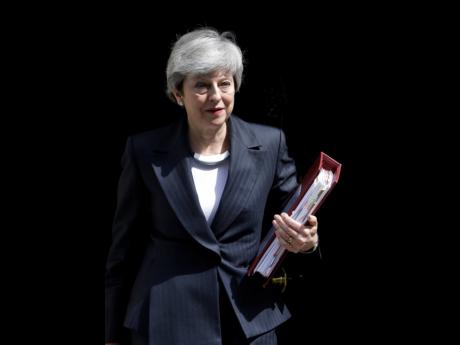Elizabeth Morgan | Brexit/EU/ACP-EU post-Cotonou negotiations: transition phases
Discussions on Brexit at the 8th Biennial Diaspora Conference last week showed the passion, anxiety and confusion which this issue generates in the United Kingdom (UK). Members of the UK diaspora present at a location roundtable on this issue supported a second referendum, feeling that they were misled in 2016. They expressed concern about the future of the Afro-Caribbean diaspora in a post-European Union (EU) Britain with increasing racism, the rise of nationalism, and the inability to secure jobs.
Regarding remittances, a warning was sounded that Jamaica should not expect remittance flows to continue at the same levels, as it is not supported among the younger generations.
Concerning Caribbean trade, as reported in March, the Caribbean Forum of African, Caribbean and Pacific (ACP) states (CARIFORUM) concluded a trade agreement with the UK rolling over the provisions of the ACP/EU Economic Partnership Agreement. Thus preferential market access will continue when the UK leaves the EU. This is now scheduled for October 31, before the EU’s change of political leadership.
The issue, thereafter, would be whether Jamaica and other CARIFORUM member states can increase exports of goods and services to the UK.
The UK’s immediate concern is selecting a new Conservative prime minister (PM) to lead the country out of the EU. This process is in progress, and it is very likely that there could be PM Boris Johnson. The Conservative Party selection process is expected to conclude by July 22, when the new PM will be appointed. I am sure they are hoping to have this process concluded before Parliament takes the summer break. Note that the Conservative Party conference is scheduled to be held from September 20-October 2. The Labour Party meets before – from September 22-25. The last EU Summit before Brexit day is October 16-17 and the UK’s decision on hard or soft Brexit should then be known. Interesting times for the UK. Theresa May remains PM until her successor is found.
I doubt that with this unsettled situation, the overdue Caribbean/UK Forum will be held this year.
APPOINTING A NEW EU POLITICAL EXECUTIVE
As Britain seeks a new PM, the EU, in the aftermath of its parliamentary elections in May, is in the process of selecting its new political executive, a president and slate of commissioners. It appears that the UK, which participated in the parliamentary elections, has said it will play a constructive role going along with the decisions of the majority.
The new EU Parliament will have its first sitting on July 2. Constituting the Parliament is important, as it approves the president and commissioners, one from each EU member state. The UK is not expected to have a commissioner. The Parliament will later also deal with Brexit and the ACP/EU post-Cotonou agreement.
The new president and commissioners will take office on November 1 for a five-year term, ending in 2024. At present, it is not clear who the new president will be, as the proposals for candidates and negotiations are still in progress. Agreeing on a presidential candidate is proving to be difficult.
The outgoing EU executive remains in office until the new executive is appointed and assumes office. Like the UK, this is a transition period for the EU.
ACP/EU POST-COTONOU NEGOTIATIONS
While the UK and EU are sorting out their political leadership, the ACP/EU negotiations for the post-Cotonou agreement is continuing in Brussels. I understand that good progress has been made on the foundation agreement and there is an outline of the CARIFORUM/EU regional protocol.
On June 7, the ACP commemorated ACP Day, which marks the signing of the Georgetown Agreement in Guyana on Friday, 6 June 1975, establishing the ACP. The Georgetown Agreement is undergoing its second revision to ensure that this organisation of developing countries can adapt to a new relationship with the EU and a new role in the international community in the future.
The EU and ACP post-Cotonou lead negotiators (Neven Mimica and Robert Dussey) will meet in July for further stocktaking before Europe goes into the August summer break. Work usually resumes in September. The lead negotiators could use the opportunity of the ACP/EU Joint Trade Ministers Committee Meeting, customarily held in Brussels in October, to have a final meeting before International Cooperation and Development Commissioner Neven Mimica demits office on November 1.
It is already anticipated that ACP/EU post-Cotonou negotiations will not be concluded until October, if then. It was already determined that a new agreement would not be ready for signature when the current Cotonou Partnership Agreement expires in February 2020. The transition measures are already being prepared.
So negotiations continue on the post-Cotonou Agreement and the ACP Georgetown Agreement as we monitor developments in Europe in this transition phase. Getting acquainted with the new EU Executive will be important for CARIFORUM, especially the new commissioners for international cooperation and development, foreign affairs and security policy, and trade.
As I have said before, with Brexit, I hope that Jamaica and other CARIFORUM members are also seeking to strengthen alliances within the EU27. Among others, I am thinking of relations with the Commonwealth EU members, Malta and Cyprus, and with the Republic of Ireland.
Elizabeth Morgan is a specialist in international trade policy and international politics. Email feedback to columns@gleanerjm.com

